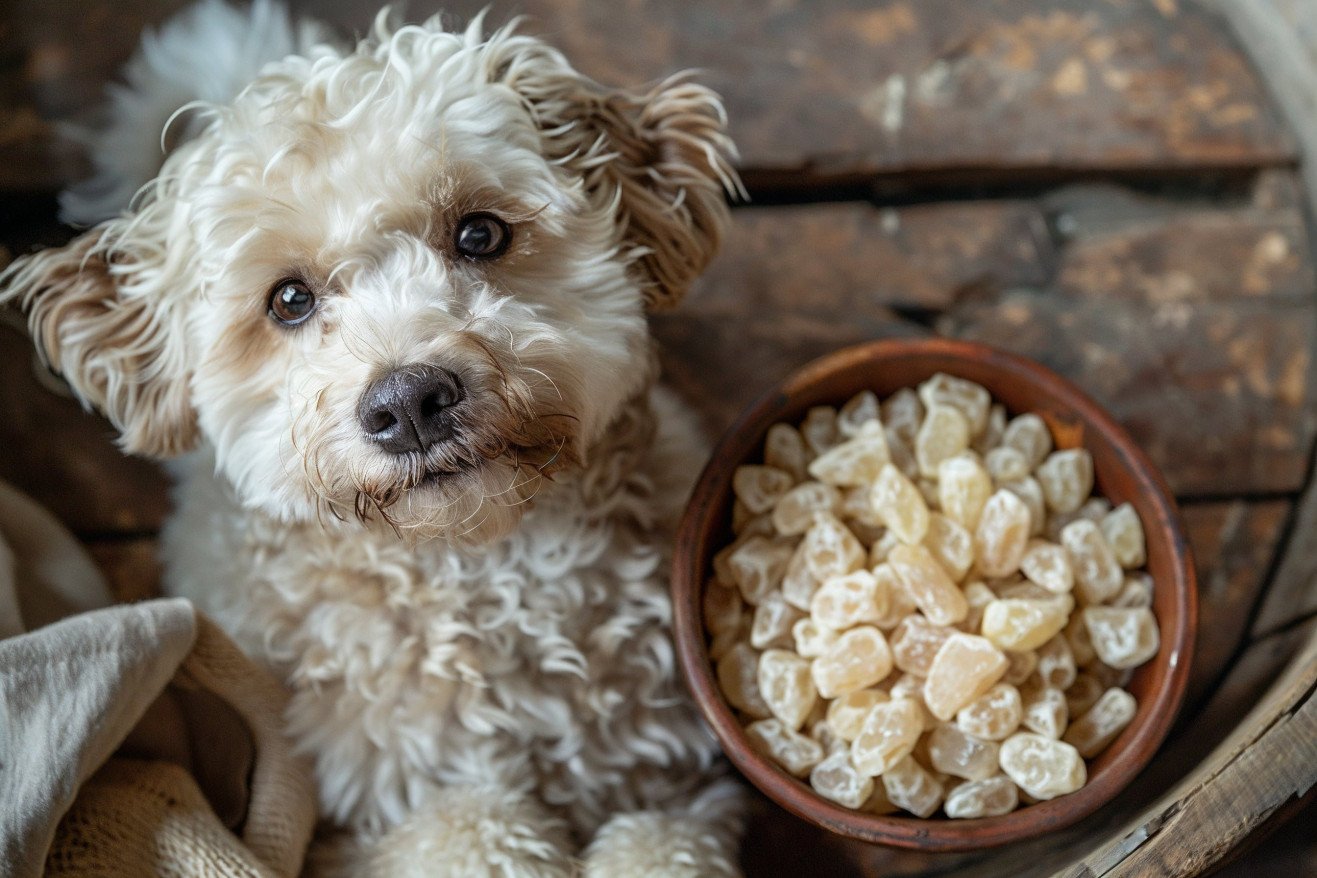Can You Use Frankincense on Dogs? Benefits and Risks
5 May 2024 • Updated 4 May 2024

With its rich history and potential health benefits, many dog owners may wonder whether they can use the fragrant resin known as frankincense on their pets. When used topically or diffused in the air, frankincense is safe for dogs in small amounts, but it can cause digestive issues, drooling, and other problems if ingested.
Despite its long history of use for its potential antibacterial, anti-inflammatory, and calming effects, we need to be careful when using frankincense on our furry friends. In this article, we’ll take a deep dive into the research and talk to experts to help you understand the potential benefits and drawbacks of using frankincense with dogs. We’ll also discuss how to use it safely, including how much to use and when to avoid it, so you can decide whether you want to use this aromatic resin in your pet care routine.
Is frankincense safe for dogs?
What Science Says About the Benefits of Frankincense for Dogs
There are several potential benefits of frankincense for dogs that are backed by science and expert opinions. Frankincense has been shown to have anti-inflammatory and analgesic effects, which means it could be helpful for issues like arthritis and general joint pain in dogs. Research has also shown that frankincense has anti-cancer effects, which could help slow the growth of tumors and support the immune system in dogs.
The antibacterial and antiseptic effects of frankincense can be helpful for digestive problems, skin issues, and wound healing in dogs. In addition, frankincense is considered to be a natural sedative, which means it can help reduce anxiety and stress in dogs.
While these benefits are promising, it's important to remember that more research is needed to determine how effective frankincense is for different issues in dogs. It's also important to remember that you should always talk to your vet before giving your dog any new supplements or treatments. That said, if you use frankincense responsibly, it could be a helpful part of your dog's health and wellness routine.
Safety and Potential Side Effects
Frankincense is generally safe for dogs, but some dogs may experience side effects, especially when using the essential oil form. These side effects can include difficulty breathing, drooling, or vomiting. VCA Animal Hospitals explains that these symptoms can be caused by the quick absorption of essential oil chemicals through the skin or when ingested.
While allergic reactions to frankincense are rare, they can occur in dogs and may cause symptoms like licking, eye discharge, or skin irritation. Holistapet explains that while Boswellia (the active component in frankincense) allergies are rare in dogs, they can develop sensitivities to natural substances.
Moreover, Vivorific points out that frankincense can interact with certain medications, including NSAIDs, so it's important to talk to a vet before using it. It's also important to make sure that the right dosage is being used, as too much can lead to side effects. The right dosage can depend on the dog's size and health status.
To make sure that dogs don't experience side effects, Pupford recommends keeping essential oils and liquid potpourri products that contain frankincense away from dogs because they can be toxic if ingested or absorbed through the skin, which would require immediate veterinary care.
How to Apply and Dose Frankincense for Dogs
If you are applying frankincense essential oil topically, it should be mixed with a carrier oil. The general rule of thumb is to mix 1 drop of essential oil with 10-25 drops of carrier oil, depending on the size of the dog. Mutt Scrub Products recommends a 1:10 ratio for large to medium dogs and a 1:25 ratio for small dogs.
For internal use, Essential Oil Vet suggests starting with a low dose of 1-2 diluted drops per day and increasing the dose as needed with the help of a vet. Frankincense can also be used in massages or applied to the spine or paws to help with pain relief and to support the nervous system.
If you are diffusing frankincense around your dog, Mutt Scrub Products says to use it in moderation and make sure the room is well-ventilated, as dogs have a much stronger sense of smell than humans. Finally, Pawsomely Healthy recommends using frankincense in combination with other natural remedies, such as CBD oil or turmeric, to maximize its benefits, but make sure to check with a vet to ensure it's safe and effective.
Other Ways to Use Frankincense for Dogs
If you're concerned about using essential oils, you can also find frankincense in supplement form. It's often combined with other supplements, such as turmeric, which may be less likely to cause side effects. Forbes Advisor lists frankincense as one of the essential oils that are safe for dogs, along with turmeric, cedarwood, copaiba, arborvitae, petitgrain, lemon, peppermint, and lavender.
Other essential oils that are safe for dogs when used properly, according to Dogs Naturally Magazine, include lavender, chamomile, cardamom, fennel, and myrrh, which can be used to treat a variety of conditions. Some dog-specific essential oil blends may combine frankincense with lavender or chamomile to create a synergistic effect.
If you want to use essential oils around your dog, make sure to use high-quality, pure oils from reputable sources and follow dilution and application instructions carefully. New Directions Aromatics recommends a dilution of 1 drop of essential oil to 1.5 tablespoons (approximately 445 drops) of carrier oil. Working with a veterinarian who is knowledgeable about essential oils and holistic treatments can help you find the best way to use them for your dog.
Conclusion: Using Frankincense for Dogs Safely and Responsibly
Frankincense is one of the most popular essential oils for dogs. This versatile plant has many uses, and it can be a great way to help support your dog's health and wellness when used correctly.
Frankincense is a resin that comes from the gum of Boswellia trees, which are primarily found in India. Frankincense has been researched extensively and has been shown to have a wide range of benefits for both humans and animals, including: anti-inflammatory and analgesic properties, the potential to kill cancer cells and support the immune system, anti-inflammatory and antispasmodic effects on the digestive system, and anti-anxiety and stress-reducing effects. According to Angela Ardolino, research has shown that frankincense oil can reduce pain and improve physical function in people with osteoarthritis.
When using essential oils on pets, make sure to dilute the oil before applying it to your pet or allowing them to inhale it. While it's safe to give your pet frankincense oil orally, you should start with a few drops in your pet's water or food each day. CBD Dog Health explains that frankincense can be combined with other oils like CBD oil and turmeric to enhance its effects.
Although frankincense is generally safe for dogs, Holistapet cautions that allergic reactions are rare but possible. Signs of an allergic reaction can include excessive licking, eye discharge, and skin irritation. It's important to watch your dog carefully when you first introduce frankincense and stop using it if you notice any negative side effects.
By learning about the potential risks and rewards, pet parents can make educated decisions about using frankincense as part of their dog's wellness plan, all while prioritizing their health and safety.


